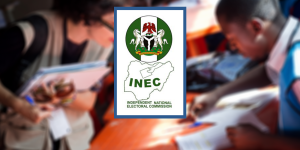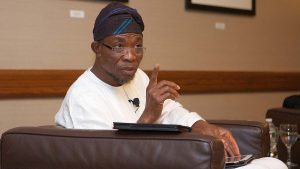THE EMERGENCE OF RAUF AREGBESOLA SUKUK CENTRE IN EDO STATE

Rauf Aregbesola has institutionalized sukuk in Nigeria. Osun Sukuk strategic plan was the first in Nigeria to use non interest debt financing instrument for investment in critical national development and sectors. The sukuk centre will carry out studies on sukuk projects in Nigeria. South-South Coalition decided to build Rauf Aregbesola Sukuk Centre in Benin City in recognition of the role played by the former governor of Osun State in institutionalizing sukuk in Nigeria. It is on record that the first set of Sukuk projects emerged from Osun State, hence, the Sukuk projects in Nigeria will ever remain the bequeathed legacy of Governor Rauf Aregbesola who was the first Nigerian to introduce it. He has always maintained that Sukuk projects are purely for business purposes and that the global issuance of it is “expanding with remarkable international reach and driven, in particular, by strong economic growth”, saying it resembles “public-private partnership financing whereby investors finance the assets and then own them which leads to real securitisation (a process of pooling/repackaging the non-marketable assets into tradable certificates of investment) after which they transfer them at maturity to the government”. There is clear indication of the growing relevance and importance of the Sukuk market in Osun State which spread to other parts of Nigeria with the growing interest from both emerging and developed jurisdictions and the strategic approaches taken to diversify the funding sources through the market.
The overall direction and potential of sukuk market are certainly well recognized, particularly in its role in contributing towards greater economic development of Osun. Osun High Schools were financed by sukuk fund for education. There is significant potential for the Sukuk, in particular to fund infrastructure projects. This would contribute towards building deeper and more liquid, efficient and effective global Sukuk market. The dynamism of the market also contributes towards strengthening financial stability and in facilitating the expansion of inter-regional investment flows. As we move towards increasing this internationalisation of Islamic finance, and thus towards greater global financial integration, it will contribute towards a global growth process and financial stability that will be mutually reinforcing. With this calibre of governments following suit to obtain Sukuk, it is now crystal clear that Aregbesola is not just a leader, but a leader that set positive pace globally.
The Federal Government has released the proceeds of the N100 billion Sukuk bond to 25 key economic road projects of the Federal Ministry of Power, Works and Housing. Finance Minister handed over the cheque to Minister of Power, Works and Housing, Babatunde Fashola. The offer was oversubscribed at N105.87 billion.
To the minister, “the milestone was a sign of confidence in the Nigerian economy and the administration of President Buhari”, adding that the Sukuk proceeds would unlock Nigeria’s potential. “This is the first Sukuk bond issuance for the Federal Government and second Sukuk bond in Nigeria because Osun State was the first to issue Sukuk bond in 2013. It is about financial inclusion and deepening of our financial markets. The proceeds will be used to further support government capital spending for 2017 and 2018 the construction and rehabilitation of 25 key economic roads across the six geo-political zones of the country.”
The question now is: are there implications of Islamic financing of these roads and their subsequent ownership by the Sukuk holders? Christians Association of Nigeria fears that the Islamic financial institutions will own the 25 major roads after construction. The answer to that fear is no and Nigerians are eulogizing Aregbesola for introducing Sukuk to Nigeria. There is no doubt about the potentials for using Sukuk as a tool for capital raising and infrastructural development in Nigeria. The Sukuk issuance attracted international acclaim by winning the IFN Africa Deal of the Year Award 2013. The Government of Osun through a wholly owned Special Purpose Company, Osun Sukuk Company Plc issued on the 8th of October, 2013 the first Sukuk in Sub-Saharan Africa worth N11.4 billion to fund the development of 11 High Schools in the State.
Aregbesola has embark on global initiative aims to support capacity building in Osun and the rest of Nigeria to advance future leadership focusing on sustainable global development by investing in human capital. As a symbol of national development, Aregbesola introduced sukuk Islamic bonds issuance programme to help fund big infrastructure needs in Africa’s biggest economy, aiming to tie the transaction to one of several projects
History will remember Rauf Aregbesola for indeed four major developments in Nigeria, school feeding programme, sukuk bond for national development, first governor to embrace 4th industrial revolution and Nigerian chocolate. Aregbesola has encouraged the issuance of sukuk in Nigeria because we needed to diversify the instrument in the bond market. Aregbesola worked hard to introduce sukuk fund for education in Nigeria. Osun took the initiative and helped in introducing it to Nigeria. The greatest lesson is that when Governor Aregbesola adopted Sukuk, an Islamic bond to help the state execute educational projects, his critics were calling for his head. Many said it was part of his ploy to islamize Osun.
The Federal Government took an example from Rauf Aregbesola by taken N100bn sukuk bond for the financing of 25 road projects being handled by the Federal Ministry of Power, Works and Housing across the country. The sukuk proceed would unlock the potential of Nigeria. The minister said, “This is the first sukuk bond issuance for Nigeria. It is about financial inclusion and deepening of our financial markets. The proceeds are used to support government capital spending for 2017 – the construction and rehabilitation of 25 key economic roads across the six geo-political zones of the country.
Former Governor of Osun State, Rauf Aregbesola has made sukuk an established financial instrument for financing government budget deficits and liquidity management of Islamic financial institutions, corporate refinancing of existing debt and business expansion. This boosts bank capital and liquidity, under Basle III provisions, financing infrastructure, especially in renewable energy, transport, healthcare, and oil and gas sectors, and in social finance to fund education and vaccination programmes, as well as monetising waqf (trust) assets for the benefit of the community it serves.
Rauf Aregbesola was the first to recognize in Nigeria that sukuk instruments as investment vehicles is used to link borrowing with the purchase of a specific asset The global sukuk market is poised for exciting new developments, not only in its traditional Middle Eastern and Asian markets, but also in the UK, the acknowledged Western hub for Islamic finance. Supply of sukuk has been driven primarily by the entry of Saudi Arabia into the market in 2017, Malaysia’s pioneering socially responsible sukuk investment strategy and, more recently, the world’s first three green sukuk issuances. Sukuk were developed as an alternative to conventional bonds which are not considered permissible by many Muslims as they pay interest and may finance businesses involved in non-Sharia-compliant activities (gambling, alcohol, pork, etc.). Sukuk securities are structured to comply with Sharia by paying profit, not interest—generally by involving a tangible asset in the investment.
Africa is for the first time embracing large-scale Islamic finance as countries seek to tap cash-rich Middle Eastern investors to finance their large infrastructure programmes. The market for sukuk, or Islamic bonds, received a boost this month after Nigeria became the first major economy in sub-Saharan Africa to use the $100bn a year Islamic market, followed days later by Senegal.
Africa is home to roughly 400m Muslims – about a quarter of the world’s total – but until now only Gambia and Sudan have issued any sukuk, and they were for tiny sums on a short-term basis. Analysts said the Nigerian sharia-compliant bond issued by Osun state in the southwest of the country, while relatively small at $62m, signalled the start of a trend.
Inwalomhe Donald writes from Benin City inwalomhe.donald@yahoo.com
![]()



